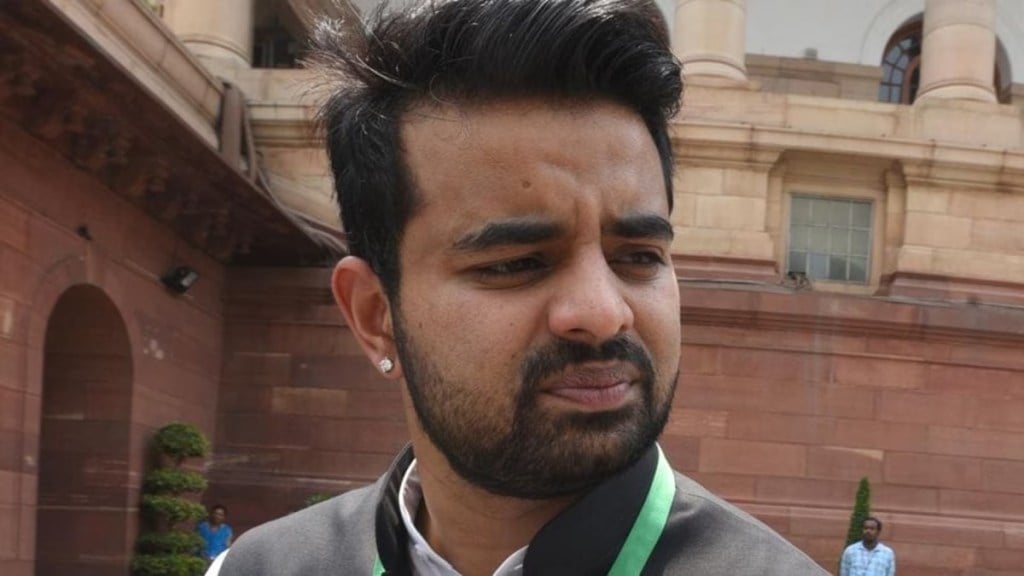Amid allegations of sexual abuse by Janata Dal (Secular) leader and incumbent Haasan MP Prajwal Revanna, it was reported that the accused had flown to Germany. On May 2, the Ministry of External Affairs (MEA) said that no visa note was issued to him and that he travelled on a diplomatic passport.
Addressing a press briefing, MEA spokesperson Randhir Jaiswal said that the Ministry didn’t issue any visa note for any other country for Revanna.
“No political clearance was either sought from or issued by MEA in respect of the travel of the said MP to Germany. Obviously, no visa note was issued either. No visa is required for diplomatic passport holders to travel to Germany. The Ministry has also not issued any visa note for any other country for the said MP…He travelled on a diplomatic passport,” he said.
JD(S) MLA and former minister H D Revanna, along with his son JD(S) Hassan MP Prajwal Revanna, are facing rape and molestation allegations following the circulation of a substantial volume of explicit videos and photos purportedly involving Prajwal. Prajwal is the BJP-JD(S) alliance candidate for the Lok Sabha polls from Hassan, which took place on April 26.
What is a diplomatic passport?
Diplomatic passports are issued to people holding diplomatic status or deputed by the Government of India for official duty abroad.
Unlike normal passports, which are valid for 10 years and have a dark blue cover, diplomatic passports are valid for five years or less and have maroon covers.
Diplomatic passports, or official passports, are issued by the MEA’s Consular, Passport & Visa (CPV) Division. They issue it to Indian Government officials proceeding abroad for official assignments/visits.
They are being issued with a specific validity five years or less, depending on the position of the holder and the nature of the assignment/visit.
The CPV Division also issues visa notes to Indian government officials going abroad for an official assignment or visit. Requests for visa notes have to be submitted in the form of a letter addressed to Joint Secretary (CPV) along with supporting documents related to the official assignment/visit.
The CPV division issues diplomatic passports to people in broadly five categories. They include those who hold diplomatic status, government-appointed individuals travelling abroad for official business; officers working under the branches A and B of the Indian Foreign Service (IFS), normally at the rank of Joint Secretary and above; and relatives and immediate family of officers employed in IFS and MEA, reports The Indian Express.
It is also given to “select individuals who are authorized to undertake official travel on behalf of the government”. This includes MPs and union ministers who travel representing the government.
Usually, the MEA issues visa notes to officials who go abroad for an assignment or visit, however, in Prajwal’s case the visa note was not issued.
This is because India has a pact with 34 countries with which it has operational Visa Exemption Agreement for holders of Diplomatic Passports only. The list also includes Germany.
According to a reciprocal deal signed with Germany in 2011, holders of Indian diplomatic passports do not require a visa in order to visit Germany, provided their stay in the Federal Republic of Germany does not exceed three months.
However, Revanna still needed to apply for political clearance for a private visit. According to the latest bulletin issued by the Rajya Sabha Secretariat, “Members, when using a diplomatic passport, are required to apply for prior political clearance directly to MEA by using the link http://www.epolclearance.gov.in and ensure that before proceeding abroad the requisite political clearance has been obtained.”
It also said that the request needs to be made three weeks in advance.
Can diplomatic passports be revoked?
Yes, but only after following due process of law, and it can be done only after a court order.
According to The Passports Act, 1967, the passport authority reserves the right to revoke one’s passport if the holder of the passport or travel document is in wrongful possession; deems necessary for the interests of the sovereignty and integrity of India.
It can also be revoked “if the holder of the passport or travel document has, at any time after the issue of the passport or travel document, been convicted by a court in India for any offence involving moral turpitude and sentenced in respect thereof to imprisonment for not less than two years”; “if proceedings in respect of an offence alleged to have been committed by the holder of the passport or travel document are pending before a criminal court in India”.

